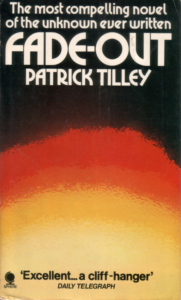 By PATRICK TILLEY (Sphere; 1975/87)
By PATRICK TILLEY (Sphere; 1975/87)
The “Most Compelling Novel of the Unknown Ever Written?” I’m not sure about that, but this alien contact novel, initially published in 1975 and revised in ‘87, is pretty damn absorbing. It’s certainly not without its share of flaws (which I’ll get to), but remains a powerful piece of work nonetheless. I’m surprised it isn’t better known.
Structured as a suspense thriller, it begins with the titular “fade-out,” in which radar screens around the world short out. The cause is an extraterrestrial spacecraft that has entered the Earth’s atmosphere, and crash lands in Eastern Montana. It’s there that the majority of the action occurs, with government officials and CIA agents taking over the crash site in order to study the craft—which, as quickly becomes clear, has a tendency to unexpectedly change its size and shape. The appearance of the craft also has the effect of exacerbating the cold war tensions of the era, as American and Russian leaders both suspect the fade-out was caused by the other, making an already tense situation even more so.
That’s all I’ll reveal of the narrative, which pivots on a succession of ingeniously wrought surprises regarding the craft and its properties. Dubbed “Crusoe,” it essentially becomes a protagonist, albeit one whose motives and capabilities are completely unknown to us.
It’s a good thing Crusoe is afforded character status, as none of the human principals, who include the President of the United States and his cadre of white male advisors, are very interesting. Author Patrick Tilley made an interesting decision to focus his novel not on the standard plucky civilians or brave cosmonauts who usually headline first contact stories, but on the powerful decision makers who run the show. This, however, only serves to make clear why that’s not usually the case.
Once again, it’s the yarn, and the manner of its telling, that make this book such a compulsive page-turner. It moves quite fast, keeps its descriptions relatively short (over-description being a common problem in science fiction) and never loses focus. It also deserves points for believability.
Yes, despite encompassing mental telepathy, physical mutation and the breakdown of civilization, the happenings described in these pages are always convincing. In other words, if an alien spaceship had actually crash-landed on Earth in 1987 this is almost certainly what would have happened. It’s just too bad about the abrupt ending, which brings the novel to a stop rather than a proper finish.
